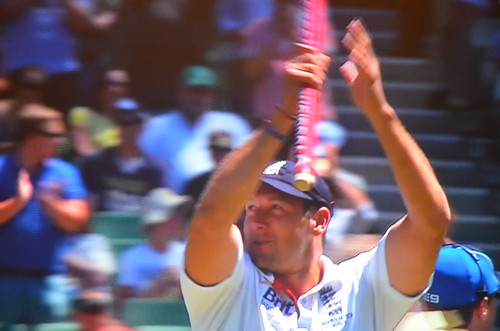Leeds Beckett University - City Campus,
Woodhouse Lane,
LS1 3HE
Analysing the role of stress in elite sport
In this post, Dr Faye Didymus from the Carnegie Faculty assesses the impact of stress in professional sport, following the news that England's Jonathan Trott has left the Ashes tour of Australia because of a long-standing stress-related condition. Batsman Trott scored 19 runs in two innings during England's first Test defeat and struggled against the bowling of Mitchell Johnson.
Psychological stress affects everyone, even the world’s best athletes. Stressful experiences are inherent in everyday life, not least in elite sport, which is an exciting but challenging profession. Competing at the top level in any sport exposes athletes to a number of psychological pressures, or stressors as they are referred to in the psychology community.
The news of Jonathan Trott’s exit from the ashes due to a stress-related illness has triggered widespread media interest in stress in sport and, perhaps more importantly, what sport performers can do to effectively cope with the demands that accompany them on their whirlwind adventures through the ranks of elite sport.
The types of pressures that athletes experience depend on a number of factors. However, cricket involves inherent novelties, such as spending long periods of time away from home while on tour, which have the potential to place increased demands on athletes.
Some examples of the stressors that may be experienced while on tour include changes to social support networks, the need to become familiar with new surroundings, and increased media attention over a long periods of time. Our recent research has found that the period of time over which a stressor persists may influence the way that an athlete thinks about that stressor and, ultimately, their athletic performance. Thus, there is little doubt that psychological stress influences sport performance but the important message is that there are plethora of tried and tested coping strategies that athletes can use to their advantage.
Some of the most effective coping strategies are seeking social support and trying to solve the problem ‘head-on.’ Athletes themselves, National Governing Bodies, and significant others can work together to optimise the coping mechanisms that athletes have at their disposal by developing strong social support networks and developing a safe environment for open channels of honest communication.
Perhaps one of the most important realisations for athletes is that stress is a natural part of life in high level sport. We all experience stress; it’s the ways in which we think about stressors and what we do to cope with them that have the biggest impact on our well-being.
So, when pondering the question of whether Jonathan Trott can return to peak performance following his release from the Ashes tour, my thoughts are positive. With time, social support, and effective management of stress-related illnesses, the odds are in favour of sportspeople returning to their sporting prowess following stress-related illnesses.
Photo used under Creative Commons licence and courtesy of Ben Sutherland
Dr Faye Didymus
Faye is Reader in sport and exercise psychology. She is chair of the Association for Applied Sport Psychology's Research Development Committee, a fellow of the Higher Education Academy, and a BASES Accredited Sport and Exercise Scientist.







